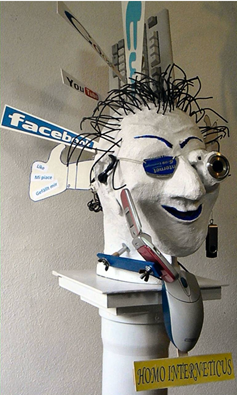 |
| Erasmo Amato |
In 2004 Michael H. Goldhaber published the essay "The mentality of Homo interneticus: Some Ongian postulates" (*) anticipating that the Internet would create a new type of human being, the Homo interneticus that would succeed Homo sapiens vulgaris. Due to the excessive use of the Internet, the Homo interneticus would have his mind altered by the constant dispute for his attention and would lose the notion of time and space.
Goldhaber's essay, from which I have extracted the following excerpt, proved to be prescient and sheds some light on the intense struggles between the tribes that follow the various most extreme and exacerbated ideologies that fill the internet space today.
«Without notable clues to a particular identity being provided by how one was raised, being cast in a sea of ten billion or so rough and directionless equals would be too much of a challenge. A floating spar — or several — must be found to cling to. H. interneticus tends towards community on the basis not of birth so much as of what feels like commonality — tasks and goals inspired by those who resonate with one — whether from some inner, possibly inchoate sense of being, a chance encounter, a shared bit of history, an aptitude that finds use, an almost arbitrary predilection or just a desire for meaning, connection or focus. These Internet communities are unshackled by space, unbounded by borders, though probably dominated by a rough version of the English language. Like any community, their enfoldings multiply through use and mutual familiarity, providing what remains of the dimension of time.
If the printed book first helped bind the world of European science and scholarship through the universal use of learned Latin [13], that language was comprehensible only to an elite — and male — few. As booksellers ought a wider market, they helped propel vernacular tongues into standardized, written and printed form. New feelings of nationality were thus brought into being, further aided by the desire for those literate in each "tongue" to have access to professions such as law and to government positions. So arose the drive for "national self–determination," meritocracy and even democracy.
Where stands H. interneticus when it comes to nationalism and electoral democracy? As an inevitable member of multiple global communities, on the whole she finds the pull of any particular nationality waning, especially insofar as nationalism implies loyalty to a particular government and its actions. If an Internet community happens to veer in some undesirable direction, it is easy to secede and start a new one with other dissidents, and in next to no time. By contrast electoral politics and representative democracy is achingly slow and unreliable, necessitating compromise and often leaving one agonizing in opposition for year upon year. H. interneticus has no sense of the future — no tolerance, that is, for waiting. Change should occur right now, instantaneously.
But what of the real, material world? Internet community formation might be an adequate substitute for representative democracy in the world of the Internet itself, but how can environmental issues, poverty, war, violent crime, terrorism, medical care, and on and on, be dealt with just by changing the subject? My guess is that to a first approximation the answer is that, for H. interneticus, cyberspace is most of the real world, and the rest is an appendage of it. If anything is to be done about global warming, for example, it will be through communities coalescing on the Internet and then taking a variety of actions ranging from developing alternative modes of transport (or dispensing with it in favor of heightened use of the net to replace travel and shipping alike) to direct action powerful enough that governments and corporations will have little choice but to acquiesce.
As Internet communities proliferate and interweave they will take on more and more of the functions now more or less the monopoly of government and business alike. It isn’t much of a stretch to visualize the Internet successes such as Google, e–Bay and Amazon gradually being replaced by open source distributed processing just as Napster was by Gnutella. From there it is not much of a further stretch to imagine the transformation of all kinds of organizations into distributed Internet versions.»
___________
(*) The term "Ongian" evokes Walter J. Ong, the American Jesuit priest and professor of English literature, who studied how the transition from orality to literacy influenced culture and changed human consciousness.

Sem comentários:
Enviar um comentário